
United Kingdom Statutory Instruments
You are here: BAILII >> Databases >> United Kingdom Statutory Instruments >> The Courts-Martial (Amendment) Rules 2005 No. 1535
URL: http://www.bailii.org/uk/legis/num_reg/2005/20051535.html
 |
[Home] [Databases] [World Law] [Multidatabase Search] [Help] [Feedback] [DONATE] | |
United Kingdom Statutory Instruments |
||
|
You are here: BAILII >> Databases >> United Kingdom Statutory Instruments >> The Courts-Martial (Amendment) Rules 2005 No. 1535 URL: http://www.bailii.org/uk/legis/num_reg/2005/20051535.html |
||
[New search] [Help]
| Made | 8 June 2005 | ||
| Laid before Parliament | 10 June 2005 | ||
| Coming into force | 1 July 2005 |
Amendments to the Army Rules and the Royal Air Force Rules
2.
—(1) The Army Rules and the Royal Air Force Rules are amended as follows.
(2) In rule 2—
(3) In Part 3, after rule 24 there is inserted—
(2) A party to the proceedings who receives a copy of an application under paragraph (1) may oppose that application by giving notice in writing to the court administration officer and all other parties to the proceedings not more than 14 days after receiving that application.
(3) Where a prosecutor wishes to adduce evidence of an accused's bad character he shall give notice in the form set out in Schedule 2 to these Rules to the court administration officer and all other parties to the proceedings not more than 14 days after preferment of a charge or charges pursuant to section 83B of the Act.
(4) Where a co-accused wishes to adduce evidence of an accused's bad character he shall give notice in the form set out in Schedule 2 to these Rules to the court administration officer and all other parties to the proceedings not more than 14 days after service on him of prosecution papers by his commanding officer in accordance with rule 11.
(5) Where an accused wishes to apply under section 101(3) of the 2003 Act to exclude evidence of his bad character, he shall apply in the form set out in Schedule 2 to these Rules and the application must be received by the court administration officer and all other parties to the proceedings not more than 14 days after the accused receives a notice under paragraph (3) or (4).
(6) An accused entitled to receive a notice under this rule may waive his entitlement by so informing the court administration officer and the party who would otherwise have given the notice.
(7) The judge advocate may—
if it is in the interests of justice to do so.
(8) Where this rule requires a notice or application to be given or made, it may be given or made by fax or other means of electronic communication.
Procedure for the admission of hearsay evidence
24B.
—(1) Where a party to the proceedings wishes to adduce hearsay evidence on one or more of the grounds in section 114(1) of the 2003 Act, he shall give notice in the form set out in Schedule 2 to these Rules and such notice must be received by the court administration officer and all other parties to the proceedings—
if it is in the interests of justice to do so.
(5) Where this rule requires a notice to be given, it may be given by fax or other means of electronic communication.
Application of rules 24A and 24B
24C.
Rules 24A and 24B shall only apply in relation to proceedings in which no charge has been preferred before 1 July 2005.".
Amendments to the Royal Navy Rules
3.
—(1) The Royal Navy Rules are amended as follows.
(2) In rule 2—
(3) After rule 4 there is inserted—
(3) The order shall be served on the accused and the court administration officer not less than 24 hours before the time appointed for the formal preliminary examination.
(4) On receipt of the order, the court administration officer—
(b) may arrange for the attendance at the formal preliminary examination of a court recorder and interpreter.
Conduct of formal preliminary examination
4B.
—(1) A formal preliminary examination shall be conducted by the prosecuting authority or a prosecuting officer appointed by him ("the conducting officer").
(2) Subject to paragraph (4) below, each witness whom the prosecutor seeks to examine orally shall be examined by the conducting officer, after which the accused shall be entitled to cross-examine the witness.
(3) A signed written statement or other record of the evidence of each witness listed under rule 4A(2)(d) above shall be read out by the conducting officer, unless the accused consents to their inclusion in the record of the examination without being read out.
(4) If the case being investigated concerns behaviour of a violent, cruel or sexual nature and the relevant witness is a person under the age of 17, then—
(4) After rule 21 there is inserted—
(2) A party to the proceedings who receives a copy of an application under paragraph (1) may oppose that application by giving notice in writing to the court administration officer and all other parties to the proceedings not more than 14 days after receiving that application.
(3) Where a prosecutor wishes to adduce evidence of an accused's bad character he shall give notice in the form set out in Schedule 2 to these Rules to the court administration officer and all other parties to the proceedings not more than 14 days after preferment of a charge or charges pursuant to section 52I of the Act.
(4) Where a co-accused wishes to adduce evidence of an accused's bad character he shall give notice in the form set out in Schedule 2 to these Rules to the court administration officer and all other parties to the proceedings not more than 14 days after service on him of prosecution papers by his commanding officer in accordance with rule 10.
(5) Where an accused wishes to apply under section 101(3) of the 2003 Act to exclude evidence of his bad character, he shall apply in the form set out in Schedule 2 to these Rules and the application must be received by the court administration officer and all other parties to the proceedings not more than 14 days after the accused receives a notice under paragraph (3) or (4).
(6) An accused entitled to receive a notice under this rule may waive his entitlement by so informing the court administration officer and the party who would otherwise have given the notice.
(7) The judge advocate may—
if it is in the interests of justice to do so.
(8) Where this rule requires a notice or application to be given or made, it may be given or made by fax or other means of electronic communication.
Procedure for the admission of hearsay evidence
21B.
—(1) Where a party to the proceedings wishes to adduce hearsay evidence on one or more of the grounds in section 114(1) of the 2003 Act, he shall give notice in the form set out in Schedule 2 to these Rules and such notice must be received by the court administration officer and all other parties to the proceedings—
if it is in the interests of justice to do so.
(5) Where this rule requires a notice to be given it may be given by fax or other means of electronic communication.
Application of rules 21A and 21B
21C.
Rules 21A and 21B shall only apply in relation to proceedings in which no charge has been preferred before 1 July 2005.".
Further amendments to the Royal Navy Rules
4.
—(1) The Royal Navy Rules are further amended as follows.
(2) In rule 28 for paragraph (1) there is substituted—
(3) In rule 29 for paragraph (1) there is substituted—
(b) in paragraph (4) for "president" there is substituted "judge advocate"; and
(c) for paragraph (5) there is substituted—
(8) In rule 53 after paragraph (4) there is inserted—
(9) Rule 54 is revoked.
(10) In rule 58(2)—
(11) In rule 64 for paragraph (3) there is substituted—
(13) In rule 72 for paragraph (3) there is substituted—
(14) In rule 77 paragraph (5) is revoked.
(15) In Schedule 4—
(16) The amendments made by paragraphs (1) to (15) shall only apply in relation to courts-martial convened on or after 1 July 2005.
Forms relating to the admission of evidence of bad character
5.
—(1) In Schedule 2 to each of the Army Rules and the Royal Air Force Rules, after "Rules 23," there is inserted "24A, 24B".
(2) In Schedule 2 to the Royal Navy Rules, after "Rules 21," there is inserted "21A, 21B".
(3) In Schedule 2 to each of the Army Rules, the Royal Air Force Rules and the Royal Navy Rules, after "Form 9—Form of order by judge advocate to permit inspection of bankers' books" there is inserted—
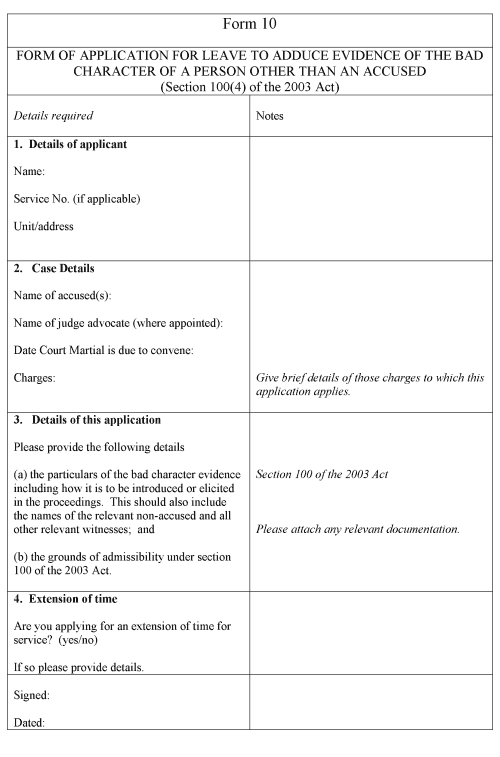
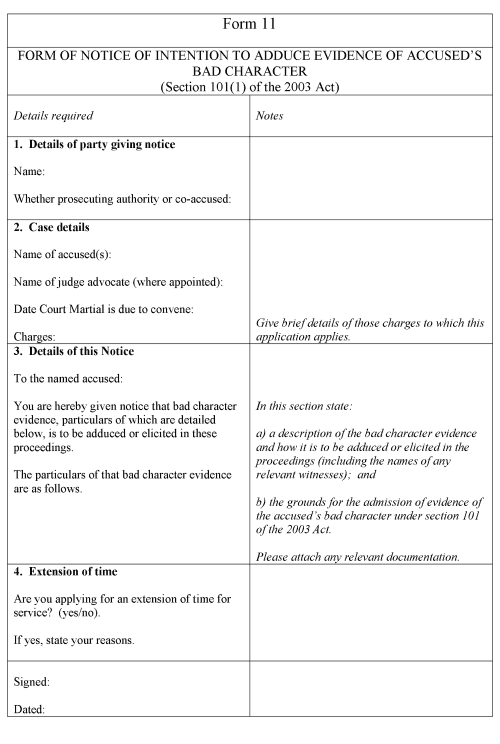
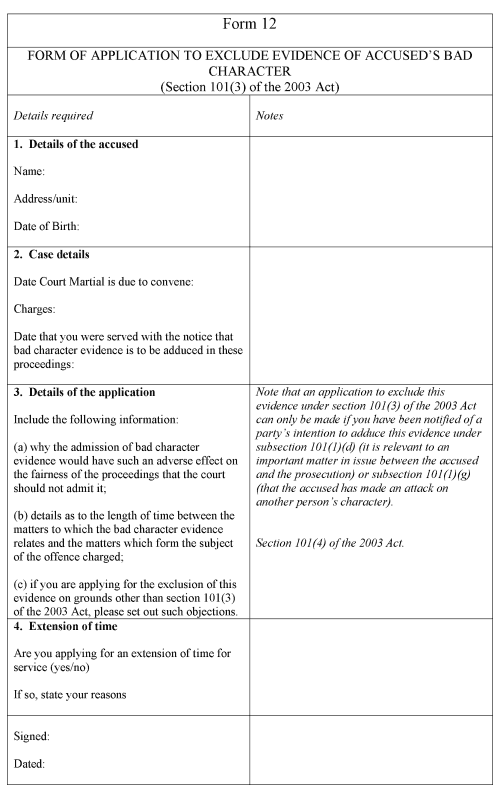
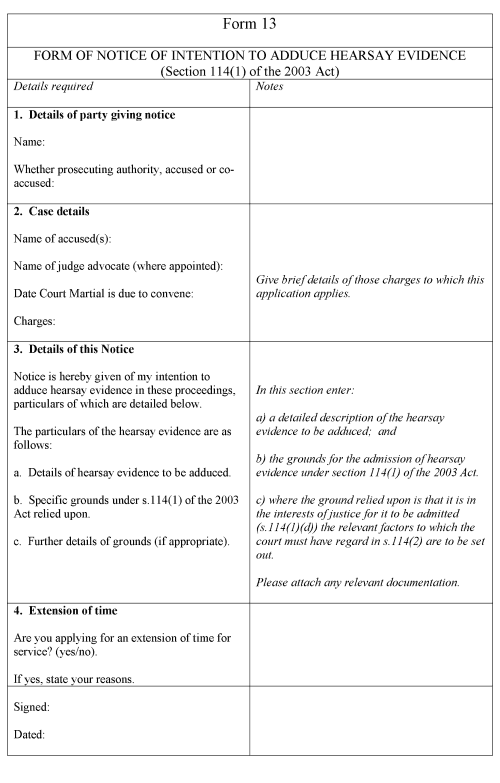
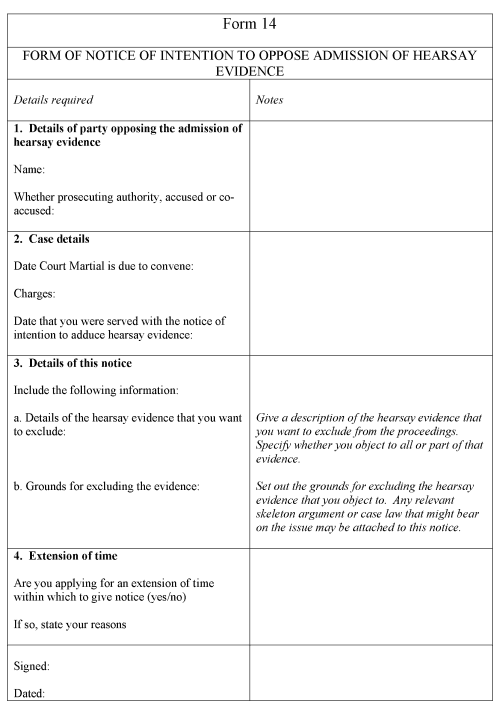
[4] 2003 c. 44: by virtue of section 113 of, and paragraph 5 of Schedule 6 to, the Criminal Justice Act 2003 ("the 2003 Act"), section 111 has effect as if, in its subsection (7), the definition of "rules of court" included rules regulating the practice and procedure of service courts. By virtue of section 135 of, and paragraph 2(6) of Schedule 7 to, the 2003 Act, section 132 is modified so that in its subsection (10), the definition of "rules of court" includes rules regulating the practice and procedure of service courts. By virtue of paragraph 6 of Schedule 6 and paragraph 8 of Schedule 7, "service court" includes a court-martial and "court-martial" means a court-martial constituted under the Army Act 1955, the Air Force Act 1955 or the Naval Discipline Act 1957.back
[5] S.I. 1997/169 as amended by S.I. 2000/2374, 2002/230.back
[6] S.I. 1997/171 as amended by S.I. 2000/2375, 2002/229.back
[7] S.I. 1997/170 as amended by S.I. 2001/2373, 2002/231.back
© Crown copyright 2005